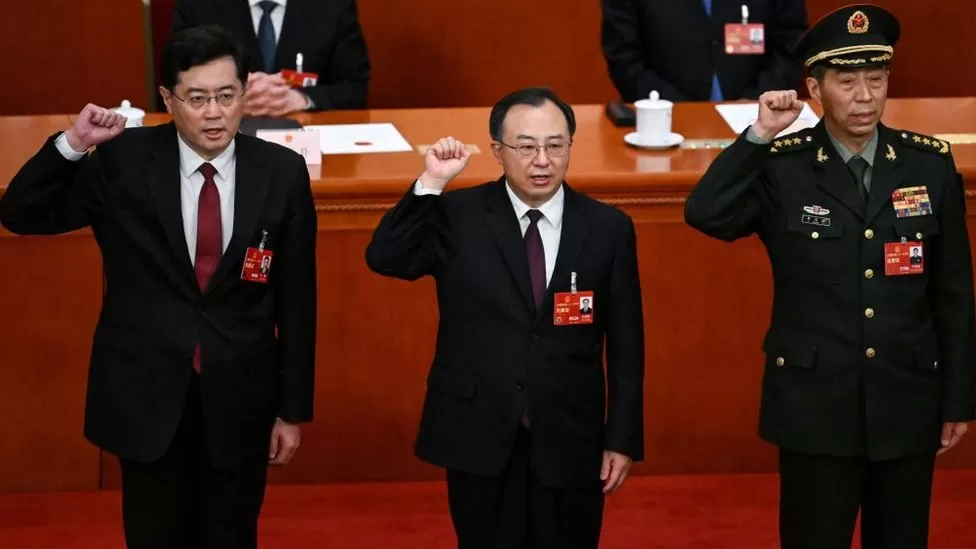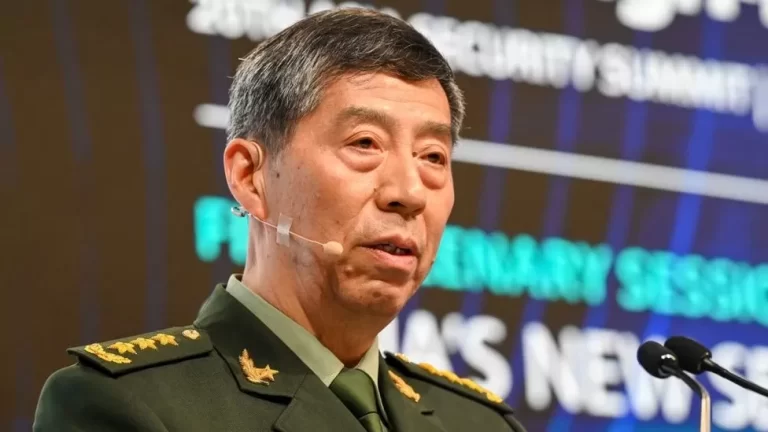A top US diplomat has questioned the absence of China's defence minister Li Shangfu, renewing speculation of a possible corruption purge.
General Li has been not seen in public for about two weeks and has reportedly missed several meetings. Rahm Emanuel, the US envoy to Japan, speculated on Mr Li's absence, tweeting that the “unemployment rate” in the Chinese government was very high.
Mr Li's absence follows recent axings of several top military officials. Citing sources in the US and China, The Wall Street Journal reported on Friday that Mr Li is being removed from his post.
It also comes months after foreign minister Qin Gang disappeared from public view. Mr Qin's sudden absence and replacement in July has still not been fully explained. In Gen Li's case too, the Chinese government has not said much. When asked about it earlier this week, a Chinese Foreign Ministry spokeswoman had reportedly said she was “not aware of the situation”.
Gen Li's last public appearance was three weeks ago – on 29 August – in Beijing at a security forum with African nations. It is not unusual for defence ministers to be absent from the public view for a few weeks. An aerospace engineer who began his career at a satellite and rocket launch centre, Gen Li has had a smooth ascent through the ranks of the military and Chinese political elite.
Just like Mr Qin, he is said to be a favourite of President Xi Jinping. He is also the second cabinet minister and state councillor, after Mr Qin, to have gone missing in recent months.
Speculation of a military corruption purge first began to mount online in early August when two generals in China's rocket forces, which control land-based missiles, were replaced. The president of the army's military court was also removed months after his appointment.
In tweets last week and on Friday, Mr Emanuel highlighted Gen Li's absence while referring to the disappearance of Mr Qin and the other military officials. He also pointed out that Gen Li had been a “no-show” for a trip to Vietnam and a Beijing meeting with Singapore's navy chief recently, alleging that Gen Li could have been placed on house arrest.
The outspoken ambassador, who is known for his colourful tweets, compared the absence to the Agatha Christie mystery And Then There Were None and Shakespeare's Hamlet. “Something is rotten in the state of Denmark,” Mr Emanuel tweeted on Friday.
A Reuters report citing Vietnamese officials said Mr Li had abruptly pulled out of a meeting last week with Vietnamese defence leaders who were told the Chinese general had a “health condition”. Singapore's navy chief Sean Wat had visited China and met military officials last week. The BBC has asked the Singaporean navy to confirm Mr Emanuel's allegation.

Mr Qin's disappearance, now coming to three months, was also chalked up to “health conditions” and has been widely speculated to be linked to a corruption purge as well. He has since been removed from his post.
Chinese officials are said to rarely miss top meetings for health reasons as they regularly undergo rigorous medical tests. Gen Li is not without controversy. In 2018, when he headed the equipment development arm of the military, he was sanctioned by the US government over China's purchases of Russian combat aircraft and arms.
The sanctions were thought to be a sticking point for Gen Li, who refused to meet his US counterpart Lloyd Austin at a Singapore defence summit earlier this year. Observers say that Gen Li's disappearance once again shows the opacity of Chinese political leadership, while also underscoring the shakiness of some of Mr Xi's decisions.
“High-level disappearances and possible corruption investigations are not a good look for Xi because he approved the selection of the current leadership,” says Neil Thomas, an expert on Chinese elite politics with the Asia Society Policy Institute.
But he added that ultimately “Xi's leadership and overall political stability do not appear under threat, as none of the cadres affected are part of his inner circle.”
Analyst Bill Bishop noted that the Chinese military has had a “long history of corruption” and Mr Xi – who under China's political structure double-hats as the supreme leader of China's military – had tried to tackle it just like his predecessors.
Nevertheless, he noted in his latest analysis, “it would be remarkable” that after more than a decade of Mr Xi in power “there is still such high-level corruption [in the military], and for the Rocket Force officers and Li Shangfu, Xi cannot blame his predecessors”.
He noted that Gen Li, Mr Qin and the rocket force leaders were all promoted by Mr Xi, and “more purges will likely be seen as the solution”.
Ian Chong, a non-resident scholar with Carnegie China, also pointed out that the disappearances are happening at a time of heightened military activity near Taiwan and tensions in the South China Sea. Chinese warships, including the Shandong aircraft carrier, have been gathering in the Taiwan Strait in recent days prompting concerns of another round of naval exercises.
As the military and foreign ministry are important outward-facing elements of the Chinese system, some “would be concerned about issues of communication, escalation and crisis management” at this point of time, Dr Chong said. Mr Emanuel's tweets would be seen as unusual for a high-level US diplomat, especially one who is ambassador to a major US ally, Japan, which has a fraught relationship with China.
While they are “perplexing”, “I am pretty sure he has a greenlight from the White House” to be pointing out Gen Li's absence in this way, said Brad Glosserman, a senior adviser with the Pacific Forum research institute.
“It is possible that Mr Emanuel is trying to elicit some response from China regarding the disappearance”, Dr Chong said.
— CutC by bbc.com


